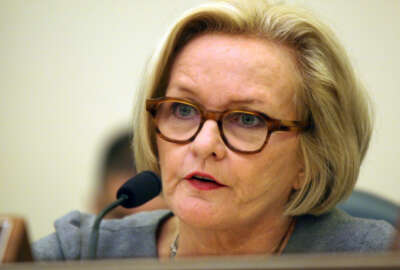About 71.2 percent of career Senior Executive Service members received a performance bonus in fiscal 2015, according to a September report on SES appraisals and awards from the Office of Personnel Management.
That’s slightly more than the 68.4 percent of career SES who picked up an award in 2014.
Just less than 49 percent of career SES received the highest possible performance rating of “outstanding” in 2015, compared to under 48 percent of senior executives during the previous year, the report said.
The average award totaled $10,746, nearly $200 more than the $10,544 executives received on average in 2014.
“The report at issue indicates that even in a tight budgetary environment during fiscal 2015, where federal agencies did not have great flexibility to differentiate pay, agencies still made distinctions in SES performance and pay,” OPM wrote in its description of the information.
Government Executive first reported on OPM’s SES performance award and appraisal data.
OPM collected pay and rating data for 7,661 members of the SES in 2015, most of whom were career executives.
The Transportation Department by far had the most career SES — 88.3 percent — earn a performance award in 2015. Nearly 47 percent of senior executives at the Office of Management and Budget earned an award last year, the least of any other agency.
| Top 5 Agencies with Most Number of SES Earning an Award |
| Transportation Department |
88.3 percent |
| Agriculture Department |
82.1 percent |
| Homeland Security Department |
82 percent |
| Nuclear Regulatory Commission |
80.3 percent |
| Energy Department |
77.8 percent |
Senior executives at the Justice and Treasury Departments earned the highest bonuses out of any other agency, $14,748 and $13,123 on average, respectively.
| Top 5 Agencies with Highest Bonuses |
| Justice Department |
$14,748 |
| Treasury Department |
$13,123 |
USAID
|
$12,266 |
| Education Department |
$12,120 |
| Commerce Department |
11,901 |
The latest report shows few changes overall in governmentwide SES bonuses between 2015 and 2014, but a deeper look shows bigger changes at individual agencies.
“This really is an agency by agency kind of phenomenon at this point, which is both good and bad,” said Bill Valdez, president of the Senior Executives Association. “I think that’s one of the reasons why you see these big fluctuations in agencies is because agency leadership largely determine the policies within that agency about how you award senior executives.”
The Veterans Affairs Department, still reeling from recent scandals that put senior executives front and center, handed out more bonuses to its SES in 2015 than it has in recent years. But fewer executives earned the highest ranking. Twice as many SES — 74 percent — received a performance award last year, compared with 36 percent in 2014.
Yet compared to previous years, fewer VA executives earned the highest possible performance rating. About 11.6 percent of SES at that agency earned an “outstanding” on their performance appraisal in 2015, compared with 16.1 percent the year before.
“It’s normal when agencies have events like VA had an event to review your performance plans, not just for SES but for everybody, and to adjust the targets and have people work toward improvement,” Valdez said. “That’s what I would suspect we’re seeing here, that they were able to motivate their SES, as they should, to perform better on critical issues.”
Though more senior executives earned the highest possible rating in 2015 than the previous year, other agencies in particular saw large shifts in that area.
OPM, for example, gave 80 percent of its career, non-career and limited term SES an “outstanding” ranking in 2014. Yet only 18 percent of its executives earned the highest rating in 2015.
Salaries barely changed for senior executives between 2014 and 2015. Senior executives on average made $170,582 without a salary adjustment or bonus in 2015, compared to $168,357 on average in 2014.
Performance awards made up 4.2 percent of executives’ aggregate salaries last year, compared to 4 percent during the previous year.
Citing challenges to recruit rising leaders to the Senior Executive Service, President Barack Obama raised the caps on performance bonuses in a December 2015 executive order designed to help agencies develop their SES corps.
OPM and OMB in August directed agencies to raise their limits on SES bonus spending for fiscal 2017 to 7.5 percent of employees’ aggregate salaries, up from 4.8 percent.
They also encouraged agencies to think more about recognizing senior executives with individual contribution awards, which are capped at 1 percent of their aggregate salaries from the previous year.
Congress has taken a hard look at SES bonuses in recent years, particularly in light of scandals at VA and other agencies.
Sen. Claire McCaskill (D-Mo.), for example, wrote to OPM over the summer asking for more details on senior executives who may have received multiple bonuses.
House Oversight and Government Reform Committee Chairman Jason Chaffetz (R-Utah) asked for 10 years’ worth of information on performance bonuses for executives at the FBI, Bureau of Land Management and the U.S. Forest Service.
The House earlier this summer passed the VA Accountability First and Appeals Modernization Act, which bans performance bonuses for VA executives between 2017 and 2021.
Copyright
© 2024 Federal News Network. All rights reserved. This website is not intended for users located within the European Economic Area.
